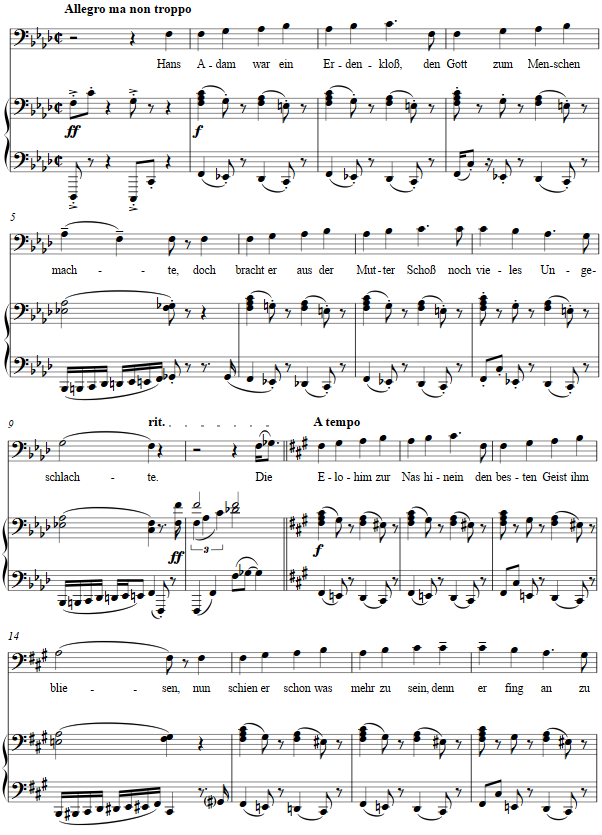Music and Texts of GARY BACHLUND
Vocal Music | Piano | Organ | Chamber Music | Orchestral | Articles and Commentary | Poems and Stories | Miscellany | FAQs
Erschaffen und beleben - (2019)
Johann Wolfgang Goethe
for baritone and piano
Hans Adam war ein Erdenkloß,
Den Gott zum Menschen machte,
Doch bracht er aus der Mutter Schoß
Noch vieles Ungeschlachte.
Die Elohim zur Nas hinein
Den besten Geist ihm bliesen,
Nun schien er schon was mehr zu sein,
Denn er fing an zu niesen.
Doch mit Gebein und Glied und Kopf
Blieb er ein halber Klumpen,
Bis endlich Noah für den Tropf
Das Wahre fand, den Humpen.
Der Klumpe fühlt sogleich den Schwung,
Sobald er sich benetzet,
So wie der Teig durch Säuerung
Sich in Bewegung setzet.
So, Hafis, mag dein holder Sang,
Dein heiliges Exempel,
Uns führen, bei der Gläser Klang,
Zu unsres Schöpfers Tempel.4 pages, circa 2' 30"
To create and animate
Hans Adam was but a lump of clay
God molded into a man,
As if dropped out of a mother's womb
To be finished by His plan.
So Elohim puffed into his nose
With a spiritual sort of blast,
But there remained more to do
Once the sneezing was fully past.
Bones and limbs and head and yet
Hans Adam was not done;
It took until Noah and a rain of drops
To fill a tankard for such fun.
Breathing clay turned drinking man
Is God's gift of alcohol,
The same as ferments with lively yeast
Man's daily bread and all.
So, Hafiz, sing a noble song
That a drunkard might make merry,
And lead us into temptation's shrine
With much of our Creator's sherry!
rhymed paraphrase by the composer
Copyright © 2019 Gary Bachlund All international rights reserved.
An aggressive cut-time setting for these five stanzas slip back and forth between two neighboring and therefore distant tonal domains, F minor and F sharp minor. The accompaniment, excepting in the short envisaging of the flood's beginning rain drops, should be bawdy and crisp, a drinking song in feel.
Goethe's fine sense of humor treats a biblical narrative with rhyme and poetic imagery, recalling the "Erdenkloß" which might apply to us all.
Source: "Und Gott der HERR machte den Menschen aus einem Erdenkloß, uns blies ihm ein den lebendigen Odem in seine Nase. Und also ward der Mensch eine lebendige Seele." 1 Mose 2:7 German: Luther (1912).
One may conclude that Goethe was aware of the Hebrew bible for the use of "Elohim" in his poem, rather than the Luther translation of "Gott der Herr," and also aware of the Koranic version of the story, in which Adam sneezes, a detail not found in biblical sources. From Genesis 2:7 in the King James version: "And the Lord God formed man of the dust of the ground, and breathed into his nostrils the breath of life; and man became a living soul.."
One reads in an Islamic commentary: "Salman Al-Farisi and Ibn `Abbas mentioned the story of Adam, when he wanted to get up before his soul reached his feet. When his soul was breathed into him, it entered his body from his head downwards. When it reached his brain he sneezed, and said, "Al-Hamdu Lillah'' (praise be to Allah), and Allah said, "May your Lord have mercy on you, O Adam.'' When it reached his eyes, he opened them, and when it reached his body and limbs he started to stare at them in wonder. He wanted to get up before it reached his feet, but he could not. He said, "O Lord, make it happen before night comes.'' Tafseer Ibn Kathir on Sura 17:12.
As to pinning the imagery of "drops" with the story of Noah, the etymology of the name, Noah, suggests one of a number of readings, so I choose on behalf of Goethe that "repose" which which man's discovery of alcohol as intoxicant "guides" man to "rest," with the next step being an urge to Hafiz to sing praises to "clinking glasses" in drink and celebration of God.
As to Hans, a number of Goethe's forefathers had the first name of Hans, which might explain the humorous connection between a character in the Genesis story and this German name. The text is from the collection known as the "Book of Singers," or "Buch des Sängers," West-östlicher Divan (1814-1836).
For other settings of Goethe's texts, click HERE.
The score is available as a free PDF download, though any major commercial performance or recording of the work is prohibited without prior arrangement with the composer. Click on the graphic below for this piano-vocal score.

